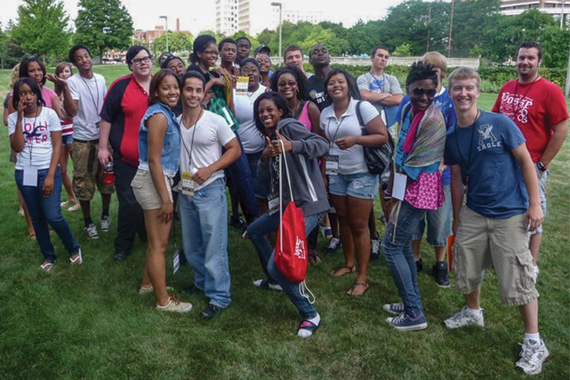
A university can be an intimidating place to those who are unfamiliar with the higher-education environment. Each year, scores of incoming freshmen at the University of Michigan-Flint, especially those who are from Flint, identify as first generation college students. While many high schools instill the importance of higher education into their students, they do not necessary train teens to be successful in college. Everything from the logistics of application processes and payment to class registration, choosing a major, and keeping up in class can overwhelm even Flint’s brightest youth. Fortunately, there are programs that stand at the fore of helping disadvantaged students navigate mysterious collegiate terrain, and UM-Flint’s Educational Opportunity Initiatives department is a leader in this area of aid.
Started in 1995 under the headship of Dr. Tendaji Ganges, EOI began as a way to combine the bevy of student-support programs offered by the university. The department would not only serve as a centralized location for these programs, it would also work to make them complementary to one another so that a student need never traverse through unknown territory alone on the road to their bachelor’s degree. What may sound like enabling at first is actually the reverse, Dr. Ganges explains. “There’s no less expectation for them to be responsible and accountable to their success,” he says, and in every case, the mentors at EOI push students to do their best.
Many of the students with whom EOI works are youth whose grades do not reflect their full potential. Dr. Ganges says, “We recruit students who are like diamonds in the rough. They’ve indicated desire and ability, though they may have not yet blossomed.” Many graduates of EOI programs become a part of the EOI staff, turning around to support new students who are in the position that they were once in.
Concerning the students who come in for pre-college support, Dr. Ganges says, “If you’re serious about getting students to succeed, you have to get to them early.” With this belief, he and the staff at EOI offer programs for high school students in the Flint Public Schools, Beecher Community Schools, and the Westwood Heights School District. One such program is Workshops on Wednesdays (WOW), which ran this past July on UM-Flint’s campus. Aimed toward area 9th – 12th graders, it’s presented as a college preparatory program that gives participants an idea of what to expect at university. Workshops cover regular staples of education such as mathematics, science and English, sessions on the administrative aspects of college such as financial aid, and preparation for the cultural aspects of college life such as leadership and diversity. Doron Pratt of EOI was excited by the success of this year’s WOW program. “We had over 100 students attend each week, and they loved it. WOW challenged their minds and kept them coming back. They are telling their friends and friends of friends to be a part of the program, as well.”
Along with student support, EOI acknowledges the importance of having parents involved in student success. Many students of EOI are first-generation college students; as a result, higher education is also new to their parents. Parents of students in EOI programs have regular meetings, and Dr. Ganges views this as one of its most vital elements. He explains that EOI “wants to see parents adapt along with their children, so we try our hardest to involve them as well.” Dr. Ganges also sees the work of EOI to engage students and parents on a university level as a small part of the larger whole that is the Flint community. He sees the future rapidly approaching, and eloquently states, “Flint must evolve quickly; we cannot do business as usual. We need to retool in order to advance, and we need to internationalize in comprehensive ways for the globalized world.”
In all, Dr. Ganges states that EOI “was not intended to build a fiefdom of programs, but to be a change agent, and a pilot of potential services for the whole institution.” The model of EOI is one worthy of recognition. It is unique in its approach at the university level, and many institutions are implementing like models as they try to cope with the influx of nontraditional students – those who attend college part-time or are starting college later in life – who have flooded universities since the mid-twentieth century. EOI knows how to work with first generation and nontraditional students well. They are a staff of leaders who are producing new leaders. Just as the department is an agent of change, they produce individual agents of change in the students that they support. The support given through EOI makes the department a wonderful microcosm for the greater Flint community to model.













